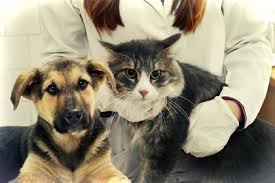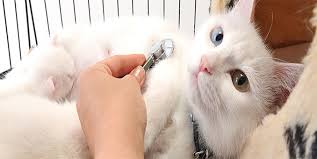Choosing The Right Veterinarian For Your Cat
Next to you and your family, a veterinarian is the most important person in your cat’s life. You want to make sure your veterinarian is giving the best care possible because he or she is responsible for your cat’s health and well-being. So how do you go about doing this?
One of the best ways to find a vet is through the recommendation of a friend. If you know someone in your area with a cat, ask them what clinic they use and what they think of the vet. The phone book and internet are also good places to start your search. Select a few practices in your area and call to see if you can come past and have a look. You don’t need to bring your cat for this initial visit. It will help you to get a feel for the clinic. You’re going to be entrusting your cat’s life to these people so it’s important that you feel comfortable with them.
Here are some things to take into consideration:
Is the facility clean?
- Are the staff professional?
- Are they friendly and approachable?
- What is their policy for emergency care?
- Do they offer boarding or grooming services?
Most veterinary clinics have one vet and several vet technicians. However, group practices are increasingly common because they allow several skill sets to be available to the patients. One is not necessarily better than the other, so use your judgment to find the ideal type of clinic for you and your cat.

Tips Before Taking New Pets to Vet
Congratulations on acquiring your new pet family member! Whether you have owned many pets or this is a first for you, this is an exciting time. It won’t be long before you get to know your pet’s normal behaviors and quirks. But, first, you must take care of your pet’s healthcare needs.
Here are five things to know before taking your new pet to the vet for the first time.
1. Don’t Delay
Even though your new kitty or pup may appear perfectly healthy, you should have him examined as soon as possible after you bring him home.
Your veterinarian may be able to detect medical issues that aren’t readily apparent at first such as a subtle skin condition or a congenital heart murmur.
Also, you’ll want to develop a relationship with a veterinarian, if you haven’t already. This way when you have a pet illness or emergency you can more swiftly to receive care.
Extra tip: For everyone’s safety, be sure you have your dog on a leash or your cat in a pet carrier when you arrive at the vet.
2. Have Reasonable Expectations
Surprisingly, I’ve met a lot of new pet owners who have the misconception that their new pet doesn’t need any booster vaccines, viral tests or deworming because someone told them that the pet “has had everything.”
Puppies and kittens need vaccinations and dewormings at regular intervals up to a certain age (this age may vary per locale). If their vaccine history is unknown, they may need more frequent boosters initially to ensure immune protection against certain viruses.
Also, heartworm tests and oral preventives, as well as feline viral tests for Feline Immunodeficiency Virus and Feline Leukemia, are important to have early on.
It’s important that pet owners—even experienced ones—know that protocols and paradigms are forever changing in the veterinary field as new information arises and thus the standard of care may have changed. Rather than make assumptions about your pet’s well being, it’s always best to schedule that new pet exam right away.
Extra tip: Remember, your new pet exam is also your opportunity to ask the veterinarian many questions about potty training, obedience and introduction to other pets and family members.
3. Spaying or Neutering
Some people think that a dog must go into heat or reach a certain age before being spayed or neutered. We now know that dogs that are spayed before their first heat have a 90% less chance of developing mammary cancer. Cats that are neutered early have minimal chances of developing urine marking behaviors.
Many new discoveries as to the long-term effects of spaying and neutering have recently been published. There are many things to consider when determining the best time to spay or neuter a cat or dog, including the breed. Talk to your veterinarian about what is best for your new pet, including any concerns you may have.

How to Choose the Right Vet for Your Pet
For most people, choosing the right vet for their pets is much harder than choosing the right physician for themselves. When choosing a vet, you’re not just looking for someone with exceptional medical skills, but also for someone with excellent people skills who understands you and your pet. And since most veterinarians work with a team of professional support staff, you’ll want to evaluate them, too, as you look for the best fit for you and your furry family members.
The worst time to find a vet is when your pet has a medical emergency, so plan ahead and do your research before you need one. The following suggestions can help you in your search.
Yellow Pages/internet search
While this is a good start, I think this should only be a first step. Proximity to your home will certainly be a factor in your decision, but it shouldn’t be the only one. A good vet is well worth driving a few extra miles. If you’re using the internet to look for a vet, use common sense if you’re visiting review sites such as Yelp. The opinions posted there are only that – opinions. Do your own research and make up your own mind after visiting potential vets.
Word of mouth/referral from friends, neighbors or family members
With most service businesses, word of mouth is usually the best way to find a provider. But a word of caution: make sure that the person referring you shares your philosophy when it comes to how to care for a pet. Not all pet owners consider pets members of the family, and even among the ones who do, there are varying degrees. Don’t necessarily trust a referral from someone you just met. When I got Feebee, who was my first cat, I was not only clueless when it came to how to select a vet, I was also new to the area, so I did what most people would do – I asked a neighbor who had a dog and a cat and didn’t pursue any other recommendations, nor did I research the clinic myself. I later found out that the vet I took Feebee to had a reputation for cutting corners during anesthetic procedures, especially in the area of pain control. Sadly, I didn’t find this out until after Feebee had already been neutered and had had a dental cleaning.

Important things to consider before getting a pet
If you are here, that means you are probably considering getting a pet. While owning a pet is rewarding, be mindful that pet ownership is also a huge responsibility. Here are several important things you should consider before getting a pet.
1. Can you commit?
Pet ownership is a long term commitment. Dogs and cats have an average life span of 10-15 years. Would you be able to commit to them for such a long time? Dogs and cats require a lot of attention. If you feel that you can’t devote your time for your pet, getting a choice is not a wise choice for you. Or perhaps you can choose getting a pet like a fish as they are less time demanding.
2. Can you afford?
Know your financial condition. Owning a pet can cost you a lot. Food, grooming, toys, veterinary care and treatment are the expenses you can’t avoid if you own a dog or cat. Owning a fish is less costly compared to other pets.
3. Will pets fit your lifestyle?
If you have long working hours, a busy social life and you travel a lot, think twice before you are getting a pet like a dog and a cat. Like I mention before, dogs and cats require attention. They need you to play and interact with them constantly. Solitude can lead to serious behavioural problem. Make sure your pet can accommodate to your lifestyle.
4. Do research
Do research beforehand on the pet you wish to get. Pet care for instance, require a great deal of knowledge. Grooming, nutrition tips and safety are stuffs you need to know before you get a pet dog or cat.Just google it. You may find tons of information through internet. If you think information from the internet are not reliable, you can always refer to the vet in your commnuity.
5. Allergies
Make sure you or your family don’t have allergies towards fur and animals. If you are not sure whether you or your children are allergic to cats and dogs, spend time at your friend’s house with a pet to find out.
Pet Insurance
Even though I am a veterinarian, I have pet insurance for my pet as there are services that I can’t always provide and they come with associated costs.
I recommend getting pet insurance BEFORE ever bringing the pet in for an exam. In my experience, owners with pet insurance are able to make decisions based on expected prognosis rather than cost when they know that some or all of the veterinary care is covered.
Once a medical condition is entered in the file, however, it may become a “pre-existing condition.” I can’t tell you how many times someone has brought a sick pet to me and, after discussing the diagnostic tests and treatment plan, they say, “Do you think I should get that pet insurance now?” Just as you want to have health insurance for yourself prior to needing medical care, the same is true for your pet!